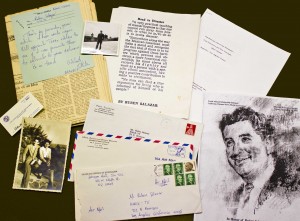Rubén Salazar Archives Placed in USC Libraries

The family of the late journalist Rubén Salazar has donated his archives to the USC Libraries. The collection – a gift from Salazar’s children Lisa Salazar Johnson, Stephanie Salazar Cook and John Salazar – includes personal and professional artifacts that document Salazar’s life from his birth in Mexico to his 1970 death in Los Angeles.
The archives include photographs and correspondence, clippings and draft manuscripts of stories, as well as cards and letters from his supporters. Such unique items as his briefcase ‑ with its contents carefully preserved – reveal a degree of detail about his life and work.
“This collection adds immeasurably to the resources available for the study of Rubén Salazar and his story,” said Catherine Quinlan, dean of the USC Libraries. “As significant as his story is to Southern California, it is also a story of much national and international significance. I am grateful to the Salazar family for entrusting their father’s archives to our libraries, and I look forward to helping make possible the interdisciplinary scholarship that is certain to emerge from the collection.”
Salazar served in the U.S. Army prior to attending Texas Western College, graduating in 1954 with a degree in journalism. From 1959 until 1970, he reported local news and wrote columns for the . Salazar left the newspaper in early 1970 to serve as news director for KMEX, the Spanish-language television station in Los Angeles.
Salazar’s work as a local reporter, Vietnam War correspondent and Mexico City bureau chief for the Times earned recognition at a time when few Latinos held visible positions as leaders in Southern California or the United States, particularly in the news media. Salazar was one of the most prominent Latinos working for any major metropolitan daily newspaper in the 1950s and ‘60s, and he had a major impact on local television coverage as news director for KMEX.
While covering the National Chicano Moratorium march against the Vietnam War, Salazar died after being struck by a teargas canister fired by a Los Angeles County sheriff’s deputy. The district attorney at the time declined to file charges against the deputy.
Professor Félix Gutiérrez of the USC Annenberg School for Communication & Journalism acknowledged Salazar’s influence on his career.
“Rubén Salazar was an inspirational role model to me when I was a college journalist in the early 1960s,” Gutiérrez said. “I got to know him later when he covered Chicano Movement advocacy for better educational opportunities. As a professor, I try to teach and live up to the high standards he set.”
Among a host of honors, Salazar was a two-time winner of the Greater Los Angeles Press Club Award, and he earned the 1965 Equal Opportunity Foundation Award. The Robert F. Kennedy Journalism Award was presented posthumously in 1971, and in 2008, the United States Postal Service honored Salazar with a commemorative postage stamp.
Gutiérrez, USC Boeckmann Center for Iberian and Latin American Studies librarian Barbara Robinson and USC Annenberg fellow Phillip Rodriguez worked with the Salazar family to bring the collection to USC.
For more on the Salazar archives, visit www.usc.edu/libraries/libwire.






